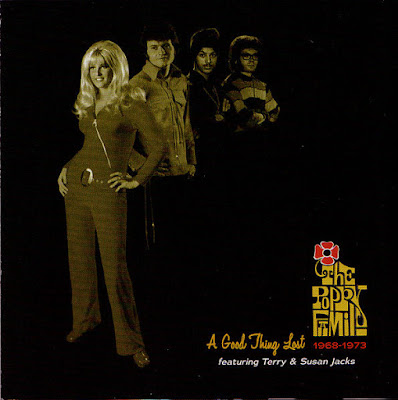The Poppy Family was a late 1960s and early 1970s Canadian pop music group, based in Vancouver, British Columbia. Susan Pesklevits and Terry Jacks met in the band Powerline. They later married and formed the Poppy Family in 1968.
"In the late summer of 1969 the Canadian record buying public chose to endorse The Poppy Family by establishing "Which Way You Goin' Billy?" as the biggest Canadian hit ever. 'Billy' successfully climbed to the No.1 spot on all radio stations across Canada. Having watched The Poppy Family from Vancouver, British Columbia, evolve as a recording group has been a satisfying and rewarding experience. The constant creative growth, both musically and lyrically, within the group is evident in the album "Which Way You Goin' Billy?".
The versatility of the group, from Terry Jacks' meaningful writing, to his wife Susan's beautiful and emotion-packed voice allow them to explore avenues of musical expression hitherto uncharted. All the while The Poppy Family retain their own sound so unique to themselves". (Fraser Jamieson, President London Records, Canada - November 17 1969).
Managed and produced by Terry Jacks, with featured vocalist Susan Jacks (tambourine/bean pod) and musicians Craig McCaw (guitar/sitar) and Satwant Singh (tablas/drums), the group recorded two albums.
At their career peak, Terry and Susan Jacks performed "Which Way You Goin' Billy?" on Bobby Darin's 1970 television variety special, "The Darin Invasion". The special also featured a young Linda Ronstadt performing her first solo hit, "Long Long Time". They also appeared on numerous other variety shows including "Rollin' On The River" with Kenny Rogers, the Bobby Vinton Show and The George Kirby Special.
The Poppy Family disbanded in 1973 when Susan ended their five and a half year marriage, the same year their solo albums were released - Terry's
"Seasons in the Sun" and Susan's "
I Thought of You Again". Terry Jacks scored an international No. 1 hit with Jacques Brel's "
Seasons in the Sun". which earned him Juno awards for Male Vocalist of the year 1973 and 1974 and top selling single in 1973 and 1974. It still remains the best selling single ever released by a Canadian artist with sales of over 13 million worldwide. He was also charted with the singles "If You Go Away" (#45 1974) (another Brel cover, previously a minor hit for Damita Jo), "Concrete Sea" (#16 1972), "Christina" (#9 1975), "Rock'N Roll (I Gave You The Best Years Of My Life)" (#22 1975) (a bigger American hit by Mac Davis), and the Buddy Holly cover "I'm Gonna Love You Too" (#7 1973). He has since faded from the recording scene.
Susan Jacks went on to release three more solo albums and had a series of Juno nominated hits in Canada including "Anna Marie" (#20 1976), "All The Tea in China" (#93 1980), and "Tall Dark Stranger" as well as other hits such as "I Thought of You Again "(#7 1974), "You Don't Know What Love Is" (#3 1973) and "You're a Part of Me" (#41 1975) (later a Top 40 hit for Kim Carnes and Gene Cotton). In 1982, she moved to Nashville, Tennessee and, in addition to recording, became a staff songwriter for a Nashville publishing company. Several of her compositions have been recorded by Canadian artists, one of her songs being recorded on a Grammy nominated children's album. She recently returned to the Pacific Northwest and has resumed recording and live performances.
Album review:
While in recent years dozens of would-be hipsters have written about the dark undercurrents to be found in the music of the Carpenters, anyone looking for a truly great bummed-out soft rock experience needs to dig up the long out of print debut LP from Vancouver's Poppy Family. While producer, arranger, songwriter, and general straw boss Terry Jacks later found fame for his hit adaptation of Jacques Brel's "Seasons in the Sun," his greatest work was with his then-wife Susan Jacks and their group, the Poppy Family. Blending moody soft pop with light psychedelia, the group hit a rich vein of gorgeous melancholy that made sadness sound positively sensual (the album's token "upbeat" tune, "Happy Island," is significantly also one of the set's weakest moments). The album's two international hit singles, "Which Way You Goin' Billy?" and "That's Where I Went Wrong," are both tales of lovers on the run that sound as desperate as Del Shannon and as lonesome as Brian Wilson's worst nightmare, and such lost classics as "You Took My Moonlight Away" and "Beyond the Clouds" are every bit as strong, boasting clear but emotive vocals from Susan Jacks, brilliant if oddball Indian percussion from Satwan Singh, and melodramatic string arrangements from Graeme Hall. And the two side-closing "freakouts," "There's No Blood in Bone" and "Of Cities and Escapes," manage to be cheesy and powerfully effective at the same time. If the '70s were supposed to be about having a nice day, "Which Way You Goin' Billy?" shows the Poppy Family were one band waiting for a cloud to blot out all that annoying sunshine; at once kitschy and marvelously sincere, it's a great record worthy of rediscovery.
(by Mark Deming, http://www.allmusic.com)
Track listing:
1. "That's Where I Went Wrong" – 2:28
2. "Free From The City" – 2:15
3. "Beyond The Clouds" – 2:30
4. "A Good Thing Lost" – 2:00
5. "You Took My Moonlight Away" – 2:40
6. "There's No Blood In Bone" – 2:55
7. "Happy Island" – 2:45
8. "Which Way You Goin' Billy?" - 3:18
9. "Shadows On My Wall" - 2:25
10. "What Can The Matter Be?" - 2:17
11. "For Running Wild" - 2:14
12. "Of Cities And Escapes" - 3:45
Musicians:
Susan Jacks: vocals, percussion
Terry Jacks: guitar
Craig McCaw: guitar, sitar
Satwant Singh: tablas, bongos, percussion
The Poppy Family - Which Way You Goin´ Billy? (1969)
(192 kbps, cover art included)






















